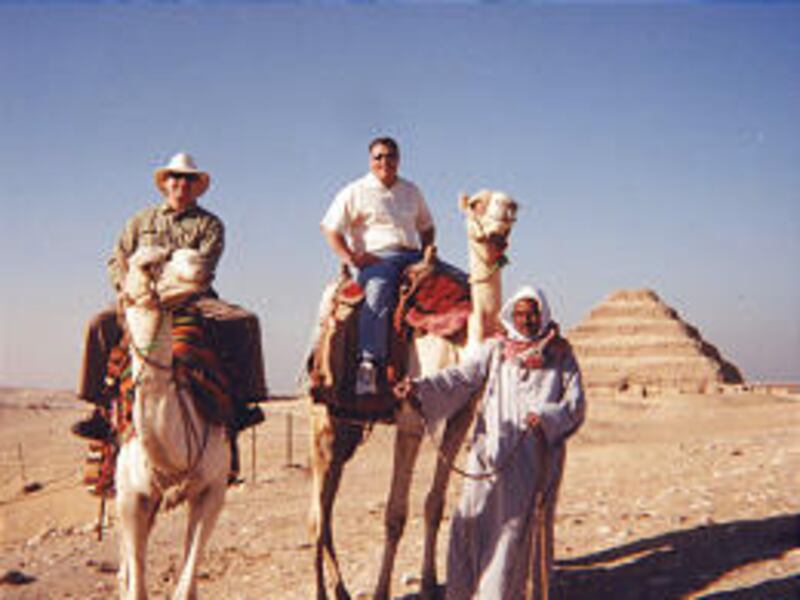There are "cold cases" and then there are really cold cases.
In 2001, Utah law enforcers Mike King and Greg Cooper traveled to Egypt in an attempt to unravel the mystery behind the death 3,300 years ago of one of the most famous leaders of all time — "King Tut," the Egyptian Pharaoh Tutankhamen.
The duo's investigation, which they described as "Sherlock Holmes meets Indiana Jones," was documented for a special on the Discovery Channel, "The Assassination of King Tut," which first aired in 2002. The video has since become one of the channel's top sellers and has now been distributed in 144 countries in 33 languages, King said.
Now, King and Cooper are ready to release a book, "Who Killed King Tut?" which goes into much more detail about both their trip and their findings.
"The movie gives a snapshot," King said. "The book gives the reader an understanding of how we developed our theories."
King currently works for the Utah Department of Public Safety in the Criminal Intelligence Center. Cooper, who used to be the chief of the Provo Police Department, recently moved back to Utah to work at a private company that produces law enforcement software.
King and Cooper were hand-selected from a small list of investigators worldwide to examine the Tut mystery. What they brought to the table was the ability to incorporate all investigative sciences including forensics and and the psychology of criminal behavior in their search for answers, Cooper said.
In addition, the two had historians and Egyptologists available to answer all their questions.
"We had the world's greatest minds at our fingertips," King said. "They gave us everything we asked for."
They entered the project without any preconceived notions of what caused Tut's death.
"We conducted a death investigation, not a homicide investigation," King said.
By the time they were finished, the duo concluded Tut's death was the result of "political assassination," Cooper said. The chief suspect was the boy king's prime minister, Ay.
"This is a theory based on the most current evidence," King said.
Ay was the "perfect chameleon," according to King. He was a non-royal who wanted power, had reasons for wanting revenge and tried to play both sides between the royal family and the Amun priests who were stripped of their power by Tut's father.
"Ay lived for power, dominion, and control. He was no different than any other murderous psychopath who roams the streets today," King and Cooper wrote in their book.
Both men admit much of the case against Ay is circumstantial. Two of the biggest keys to the case centered around Tut's tomb. One clue came from what was, and was not, found inside. The other was the rushed manner in which Tut was entombed.
"This is the most important event in a Pharaoh's life," said King of Tut's burial. But Tut's entombment was rushed and performed without much ado.
If this were a case being looked at today, King and Cooper are confident they'd be able to get a federal grand jury indictment against Ay. In fact, they even made up a pretend indictment in their book imitating what that real one might look like.
The indictment charges Ay with criminal homicide.
As to exactly what killed Tut, King and Cooper said they still don't know.
The two aren't sure their book will really change any views of what happened to Tut. Some Egyptologists have disputed and criticized their findings. But Cooper said critics are already preconditioned by their own conclusions.
And if new technology allows someone else to go to Tut's tomb in the future and come up with new evidence and a different conclusion, Cooper and King said they'd welcome the findings.
In addition to going into depth on their findings, the book also gives more into detail about the duo's travels and the surrounding environment. Cooper and King arrived in Egypt right after the attack on the World Trade Center. The two had to travel with a military escort to many areas as Jihad members were training just over the hills from them.
As for the future, unraveling history's mysteries is expected to keep the two Utah sleuths busy for awhile. Both have worked on projects for the History Channel and A&E since their Tut adventure.
King and Cooper are considering several options for their next big project together. One option is to examine the mysterious death of Meriwether Lewis to coincide with the bicentennial of the famous Lewis and Clark expedition.
Lewis died a violent death in 1809. President Thomas Jefferson called it a suicide, but Lewis' family claimed it was murder.
Another potential project is the death of Matthew Hopkins, the Witch-Finder General of England in the mid-1600s. Hopkins was believed to be responsible for the executions of more than 200 "witches."
His cruel methods were eventually challenged, however, and Hopkins died mysteriously. Some believe he was tried as a witch himself and drowned while others believe he died of an illness.
E-mail: preavy@desnews.com



